- Home
- Pam Jenoff
The Other Girl Page 6
The Other Girl Read online
Page 6
Helena crossed the ward. Though it was a dismal affair, there were little touches, light-filled windows and slightly wider-than-average beds that said the people who ran it had once cared. Nearing her mother, Helena’s heart sank. Mama had been a beauty, tall and slender with alabaster skin. Now her green eyes were clouded and her chestnut hair dulled to a lifeless gray. The skin below her cheekbones had caved in, giving her a ghoulish look. “Mama,” Helena said, touching her hand. Her mother did not move or respond, but stared vacantly at the ceiling.
The elderly woman in the next bed listed to one side, her gown hanging open to expose a withered breast. Helena walked over to her and straightened the woman’s head, keeping her own eyes averted as she fixed the woman’s gown. “Excuse me,” Helena said gently, hoping she did not mind the intrusion. The woman blinked, conveying with the simple movement an ocean of gratitude and relief.
A nurse moved swiftly at the other end of the ward, folding blankets, shifting patients from side to side with deft hands as she freshened the beds. Her name was Wanda, Helena recalled. She was more capable than most of the other staff, and kinder when time allowed it.
“Dzie´n dobry,” Helena greeted as Wanda neared. The heavy-boned nurse did not respond, but stared downward at the fresh red wound on Helena’s hand.
As if on cue, the cut from the thorny bush, which Helena had rinsed hurriedly in the icy stream, began to throb. Wanda disappeared into a closet across the room and emerged a moment later with a piece of damp gauze, which she gave to Helena. She closed the closet door swiftly, as though something might escape.
“Thank you.” As Helena cleaned the wound, alcohol stinging the raw skin, she waited for Wanda to ask how she had hurt herself.
“She sat up this morning,” Wanda informed her instead, too busy to take further interest in maladies not her own. “Took a bit of broth and even said hello to me.” The words, offered to make Helena feel better, slammed her in the chest. Her mother had been cognizant for a fleeting moment and Helena had missed it. Had Mama felt all alone, confused about where she was and why no one was there with her?
“Perhaps in the spring when the weather is nicer, I can wheel her outside in one of the chairs,” Helena offered.
A strange look crossed Wanda’s face. Did she not think that Mama would still be here then, or was her concern larger than that? “With so many Jews gone...” Wanda faltered in her explanation.
“Where have they gone?” Helena was glad to have the opportunity to ask.
Wanda lowered her voice. “Some have left the city, or even gone abroad, if they were able. Others have been ordered to the ghetto.”
Helena shook her head. “Ghetto?”
“The walled neighborhood in Podgórze.” Helena had passed by the industrial neighborhood across the river and seen the streets that the Germans had begun to cordon off. She had surmised that some Jews from the villages were to live there. But it seemed odd to relocate the Kazimierz Jews, who already had a neighborhood of their own. And if the Jews were going, what future could the hospital have here? “Will they all go?”
“I doubt it. There are still a good number of Jews living in Kazimierz.”
Mama coughed once, then again. “Is Dr. Ackerman here today?” Helena asked. “I need to speak with him about my mother’s medicine.”
Wanda frowned. “He’s been called away.” Helena sensed that it was better not to ask when he would return. At first the war had seemed a boon to the hospital—the Jewish doctors, forbidden from treating Gentile Poles, had flocked eagerly to work here. But their numbers had diminished ominously in the preceding weeks. “And I’m sorry about the medicine. We haven’t been able to get any new shipments of the laudanum and so we’ve had to dilute what we have left in order to make it last.”
They had decreased Mama’s dosage, Helena reflected, and yet she was no more lucid—further proof that wherever her mind had gone with the illness, it wasn’t coming back. “Then perhaps another medicine,” she suggested. “Something that doesn’t make her so drowsy.”
“I’ll ask.” But Wanda’s tone made clear that there were no other drugs to be had.
“The medicine supply,” Helena persisted, “is there truly nothing to be done?”
Wanda’s forehead crinkled. “I’ve tried the other hospitals, even gone to the Mariacki Cathedral to see if any could be bought.”
She was talking about the black market, Helena realized, caught off guard by the casual way in which the nurse mentioned procuring illegal goods, in a church no less. Helena considered the nurse: Wanda did not wear the yellow star of a Jew. Yet she had chosen to remain working here. Helena was touched by the nurse’s effort, risking her personal safety to help her patients. “Here.” Helena fished in her pocket for a coin. She could ill-afford to give away money now, but in addition to expressing her gratitude, it might buy Mama an extra moment’s care. She watched the conflict that washed over Wanda’s face, wanting to refuse the offering because taking care of Helena’s mother was her job.
But no one could afford to be that proud in times like this. Wanda took the coin and shoved it into her pocket. “Dzi˛eki.” She shuffled past, continuing on her rounds.
Helena settled into the chair beside the bed. Mama had suffered silently for months with what she presumed were just the normal aches and tugs of a body that had borne five children trying to pull itself back into place. But the pain grew worse and her appetite waned and by the time the village’s lone doctor came he could feel the lump in her belly, larger than an apple. She might have stayed at home until the end of her days, had fought for it. But then her mind started to slip, as though the cancer had spread there, or perhaps the fate she was going to face was simply too much to contemplate. One night they’d found her over the baby’s crib holding a pot of hot water and they knew the time had come for her to go.
Helena pulled out the bread wrapped in paper. She tore it into small pieces and held it out. “Look, Mama,” she offered, bringing the dry, flat bread close to her mother’s nose. “Ruth baked this for you yesterday.” Even Ruth’s best efforts could not come close to the bread Mama had once made, but it was hardly a fair comparison, given the lack of good flour these days.
When Mama did not respond, Helena leaned forward and dipped the bread into the glass of tepid water that sat on the table beside the bed. Then she lifted her mother’s head and put a small piece in her mouth, willing her to eat it. But the bread lay between her slack lips. Finally, Helena removed it again, fearful that she would choke. A sour smell came from between her lips, the teeth Mama had maintained with such care beginning to rot. Helena stared at the remaining fistful of bread uncertainly. No one would take the time to feed it to her once Helena was gone; it would just be taken by one of the nurses or other patients. She tucked it back in her bag.
Helena gazed out the window, grateful yet again that the ward in which her mother was located looked into the interior courtyard. From here, Mama could not see the military vehicles that rumbled by or the German soldiers in the streets. A different room would have made the pretense of normalcy impossible.
“You aren’t going to tell her about the war, are you?” Ruth had asked their father the first time he prepared to set out for the city after the invasion. Overhearing, Helena had been surprised. It was a war, for goodness’ sake, and their mother was at the heart of it. But Tata hadn’t said anything. Looking around the sanatorium now, Helena was struck by how little had changed—the machines still hummed and the patients still moaned, trapped in their own private battles. So the fiction had persisted.
Beside Helena, her mother stirred. “Mama?” Helena leaned forward, hope rising in her as she kissed her mother on her papery cheek.
But her mother only looked at her blankly. Did she wonder why her beloved husband no longer came to visit, or had she not noticed? “Ruti?” she asked, using her pet name f
or Helena’s sister.
Helena blanched. No, it wasn’t Ruth who was sturdy enough to make the journey, or brave enough to try. But if thinking it was so brought their mother comfort, Helena would play along. “Yes, Mama, it’s me.” It should have been Ruth here, Helena reflected. She had always been closer to Mama, sitting at their mother’s side, learning with rapt attention how to cook and sew while thick-fingered Helena followed Tata into the woods, gathering kindling and roots. Sometimes it seemed as though she and Ruth had been cast into those roles at birth. “The pretty one,” she’d heard people remark more than once about Ruth—but how was that possible when they were twins and meant to look just the same? She herself had been deemed sturdy and capable for so long she could not fathom where the idea had first arisen. Had their parents noted these differences in them from the start and nurtured them, or had they grown to play the parts they had been given?
“Jealous, even as a baby,” their mother had remarked of Helena more than once over the years. “You would give me such a look when I held your sister instead of you.” I wasn’t jealous, Helena had wanted to respond later, when she was old enough to understand. I just wanted to be held, too, to be a part of things before you had to set us down and move on to the next task or chore. But it was always that way with twins, never enough time or arms to go around, and the extra always seemed to go to sweet, helpful Ruth.
The sisters had always been a great source of curiosity in the town, the first set of twins seen there in more than a generation. “And after, when the midwife put you both in the cradle, the first thing you did was hold hands,” Mama was fond of recalling. “She’d said she’d never heard of such a thing.”
Whenever they went out, people made sport of trying to guess which one was which. “No, no, don’t tell me!” In fact, the sisters had subtle differences: Ruth had a rounder face and large blue eyes while Helena’s own features were plainer, her skin more ruddy than luminescent. And there was the birthmark, too, heart-shaped just below Ruth’s right ear, which Ruth desperately tried to conceal, that made them impossible to confuse if one looked closely. But to the casual observer, they were indistinguishable.
Helena sat in silence for several minutes. There were things she wanted to ask her mother now, about how to make a good poultice for the goat’s wounded leg, and the way to get the cabinet above the stove to stop sticking. She wanted to tell her mother that Dorie had lost another tooth, how Karolina was starting to speak a bit. But she was never sure if hearing about the children would make Mama happy or more forlorn, or even if she remembered them at all.
She searched her mother’s face, looking for some words that would change it all. But she had stopped believing in magic years ago, and prayers were Ruth’s province. “Come back to us,” she said plaintively, knowing there would be no response.
Helena opened the drawer on the night table and busied herself taking inventory of the scant contents, taking note of the spare sock that was missing. She picked up her mother’s extra housecoat, which someone had shoved in the drawer without bothering to fold. There was blood at the collar. Helena bent hurriedly to check for a wound, and Mama winced, as though accustomed to a rough touch.
“Shh,” Helena soothed, willing herself to move more slowly. But there was no mark on her mother’s neck. Had the blood come from an old wound or had someone else worn the gown? She put it in her knapsack, replacing it with the fresh one she had brought with her.
“I should go,” she said finally. Guilt rose in her then as it always did at the notion that after she left Mama would again be all alone in this sad place. But she had to get home to help Ruth, and if she didn’t leave now she would not make it before dark. She searched her mother’s face for some reaction, but found none. No, the sadness about parting was all hers. Mama was already alone.
Helena left the hospital, retracing her steps through Kazimierz as she made her way from the city. The gray clouds had grown thick and ominous now, the air biting. The earlier dampness under her clothes had dried to an uncomfortable chill. As she wound her way around the base of Wawel Castle, Helena peered over her shoulder, inexplicably fearful that someone might be following her. Spotting nothing unusual, she pressed forward, heart beating just a bit too quickly. Despite her anxiety, she could not help but feel a touch of excitement. For so long it had seemed that everything moved around her while she stood in place like the moon behind the clouds. Now with the explosion she was sure she had heard the previous night and the sighting of the German jeep, the world had shifted slightly and suddenly life felt different.
As she crossed the wide bridge that spanned the river, her thoughts turned to her father. The priest had called Tata a hero for stepping in front of the runaway wagon and blocking it from hitting a child. Helena knew he was the furthest thing from that, though. Tadeusz Nowak was a drunk and he had most likely gotten hit because he was too inebriated to move out of the wagon’s path, even at ten o’clock in the morning. But she said nothing, accepting the neighbors’ gifts of sympathy, the soups and baked goods that flowed much more generously than if he had been found lying in a pile of vodka and vomit.
Helena was the one who had answered the knock the day they came about Tata and followed the constable to the site. There were details she would spare Ruth and the others about the way he had soiled himself, how his neck hung at a funny angle like a broken doll. She had focused instead at the hands and arms that were as familiar as her own.
Tata had been her counterpart, the one most like her, and with his death a part of her had died, too. But after he was gone she discovered a newfound clarity and purpose, slipping into his role, taking charge of the wood and the hunting and their safety. She found she was capable of doing things that she had never been taught, as though a part of Tata had left his body in the moment he was struck down and leaped into hers.
An hour later, Helena reached the edge of the forest. She rubbed at the back of her hand where a bit of pine tar had stuck above the wound, contemplating her route. The road would have been faster, but she would take the high pass over the mountain so as not to risk encountering more Germans. She started forward. The terrain ahead was much more difficult, the rolling hills deceptive. It gave no indication of the steep slope, or the sharp stones that jutted out from the ground, marring the path. Helena navigated through the rocks, finding the familiar footholds. She had come this way every week as a child on walks with Tata. She had loved the springtime best when they would gather mushrooms, father and daughter making their way through the woods in the predawn darkness, the silence only broken by the sloshing of his flask.
The goodwill of the neighbors had evaporated quickly after their father’s death, as people pulled back to whisper about how the Nowak children—now virtually orphans—would survive. Helena did not mind—she preferred their distance to the overkindness she had never quite believed. There was speculation, too, about the lack of a possible suitor for either twin. Ruth had had someone for a time, a big strapping boy called Piotr. He had called on her faithfully each week, bringing the odd bit of candy for the children. But then the business with their father had happened and Piotr had come one last time to speak with Ruth. Helena had not been able to hear their conversation, but when she had peered around the side of the barn she spied them down by the stream, Piotr handing back the brown scarf her sister had knitted for him, Ruth pushing it away so that it dropped to the ground. Helena had rushed out afterward to collect it so the scarce wool could be reused.
When Ruth had come back inside the house, Helena had faltered. She put her arm around Ruth’s shoulder, cringing at her own stiffness. “I’m sorry.”
Ruth shrugged off her arm and stepped away. “You never liked him.” Ruth’s tone was accusing. Helena wanted to deny it, but Ruth was right: she had not liked Piotr, and had resented that Ruth had something beyond their family. She had not wanted him to stay. But now he had hurt Ruth, though, and for
that she wanted to kill him.
Though Ruth had not said, Helena knew that it was the children who had caused Piotr to run. No man wanted to take on the responsibility of caring for someone else’s family, especially not one with young mouths needing to be fed for so many years yet. There would be no marriage for her or Ruth now; of that she was sure. So they would go on working and keeping the children alive until they were big enough to fend for themselves. Michal perhaps would support them in a few years or the younger girls might someday marry; they were pretty enough. What else? Helena could plant a good-size garden in the spring and sell the extra bounty in town. She’d heard that the war had opened up jobs for the women left behind by the men forced to go and fight. But even if she could secure a work pass, traveling to the city once a week was hard enough; she could not commute daily and she could not leave Ruth alone with the children for longer than that.
As Helena paused to catch her breath, an unfamiliar scent tickled her nose. It was sweet yet acrid, like when the farmers burned brush in early autumn and something unintended got tossed into the fire, a dead squirrel perhaps. No one was burning this late in the season, though. Looking west, she noticed then a thick finger of dark smoke curling toward the sky. Where was it coming from? There were no factories in that direction and it was too far beyond the trees to be a forest fire.

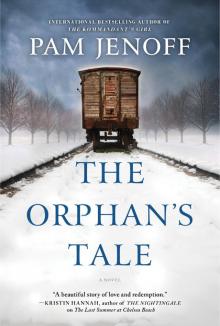 The Orphan's Tale
The Orphan's Tale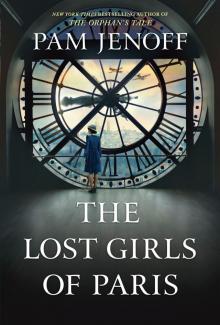 The Lost Girls of Paris
The Lost Girls of Paris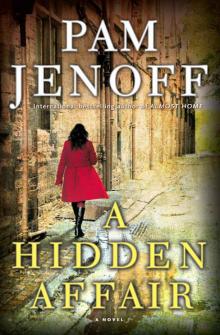 A Hidden Affair: A Novel
A Hidden Affair: A Novel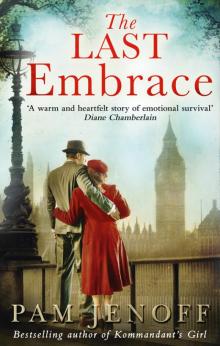 The Last Embrace
The Last Embrace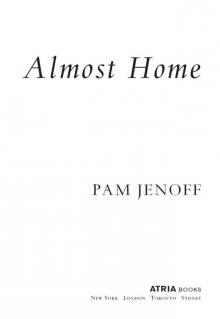 Almost Home: A Novel
Almost Home: A Novel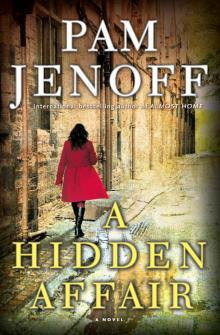 A Hidden Affair
A Hidden Affair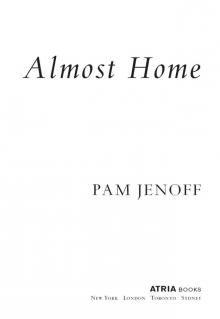 Almost Home
Almost Home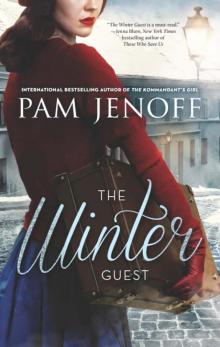 The Winter Guest
The Winter Guest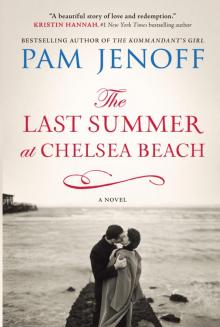 The Last Summer at Chelsea Beach
The Last Summer at Chelsea Beach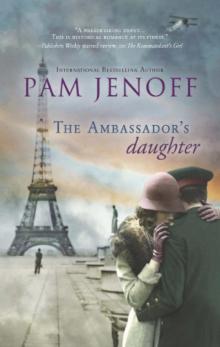 The Ambassador's Daughter
The Ambassador's Daughter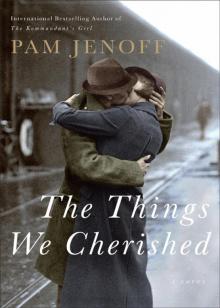 The Things We Cherished
The Things We Cherished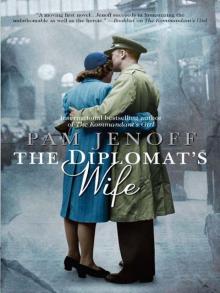 The Diplomat's Wife
The Diplomat's Wife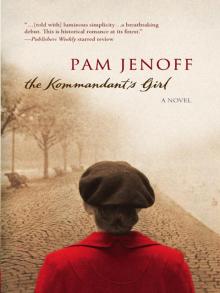 The Kommandant's Girl
The Kommandant's Girl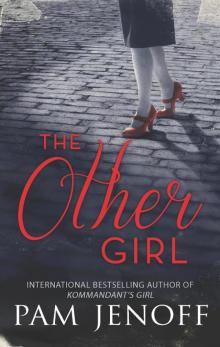 The Other Girl
The Other Girl